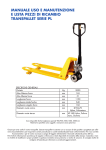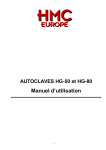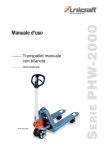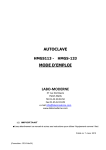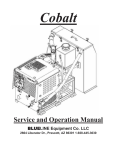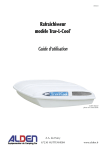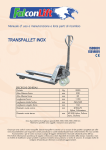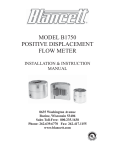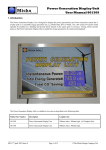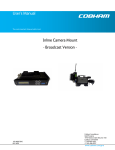Download User Manual HP ESR20
Transcript
User Manual HP ESR20 Note: Operator MUST read and understand these operating instructions before using this Hand Pallet truck. 0 OPERATIONAL MANUAL Index 1. 2. 3. 4. 5. 6. 7. 8. 9. General specifications Pre-operation procedure 2.1. Mounting indicator 2.2. Attaching the handle to pump unit To adjust release device Use of weighing pallet truck 4.1. Accurate weighing 4.2. Touch panel indicator 4.3. 1. Net + 2. Tare = 3. Gross 4.4. On / Off 4.5. Error messages 4.6. Zero and tare functions 4.7. Total and reset 4.8. Totalling 4.9. Printer (Option) 4.10. Printout (Option) 4.11. Paper change (Option) Trouble shooting the scale Maintenance 6.1. Oil 6.2. To remove air from the pump 6.3. Daily check and maintenance 6.4. Lubrication 6.5. Battery replacement 6.6. Maintenance of display unit Guide to safe operation Trouble shooting Wiring diagram of scale, junction box, sensor 2 2 2 2 3 3 3 4 5 5 6 8 9 10 11 12 13 14 15 15 15 15 15 15 15 15 16 17 Rev.17.07.07 1 Thank you for using this pallet truck with scale. Your pallet truck with scale is made of high quality steel and was designed to give you a durable, reliable and easy to use product. For your safety and correct operation, please carefully read this instruction before using it. NOTE: All of the information reported herein is based on data available at the moment of printing. We reserve the right to modify our own products at any moment without notice and incurring in any sanction. So, it is suggested to always verify possible updates. 1. GENERAL SPECIFICATIONS Capacity Power Source Environment Operating temperature Min/Max fork height Features weighing accuracy Width over forks Fork Length 2,000kg/4,500lbs 4 “AA” penlight batteries General purpose, dry -10oC to 40oC (14oF to 104oF) with 10 to 95% relative humidity 76mm/190mm 88mm/200mm +1.0kg for loading 2,000kg 568mm/703mm 1150mm/1220mm 2. PRE-OPERATION PROCEDURE 2.1. Mounting indicator 2.2. Attaching the handle to pump unit 2.2.1. Insert the draw-bar onto the pump piston (303), then use a hammer to insert the axle with hole (G105) into the hydraulic pump and draw bar from the right to the left (see figure 1). 2 2.2.2. Put the control handle (G117) to the lower position, then pass the adjusting nut (G104), adjusting bolt (G103) and chain (G102) through the hole of the axle (G105) with your hand. 2.2.3. Press the draw-bar (G110) down, take away the spring which fixes the Spring Cap (301). 2.2.4. Put the control handle (G117) to then raise position, the raise the lever plate (319) with the pin and insert the adjusting bolt (G103) into the front slot of the lever plate (319). Note: keep the adjusting nut (G104) underneath the lever plate. 2.2.5. Use a hammer to tap another elastic pin (G106) into the axle with hole (G105) The draw-bar is now assembled to the pump. 3. TO ADJUST RELEASE DEVICE On the draw-bar of this pallet truck, you can find the control handle (G117) which can be regulated in three positions: Raise - handle down Drive - handle in center Lower - handle up, the lever moves back to the drive position when released. If, however, they have been changed, you can adjust them according to the following instructions: 3.1. If the forks elevate while pumping in the drive position, turn the adjusting nut (G104) on the adjusting bolt (G103) or screw (318) clockwise until pumping action does not raise the forks and the drive position functions properly. 3.2. If the forks descend while pumping in the drive position, turn the nut(104) or screw(318) counter-clockwise until the forks do not lower. 3.3. If the forks do not descend when the control handle (117) is in the lower position, turn the nut(104) or screw (318) clockwise until raising the control handle(117) lowers the forks. Then check the drive position according to item 3.1 and 3.2 to be sure the nut (104) and screw(318) is in the proper position. 3.4. If the forks do not elevate while pumping in the raise position, turn the nut (104) or screw (318) counter-clockwise until the forks elevate while pumping in the raise position. Then check the lower and drive position according to item 3.1, 3.2 and 3.3. 4. USE OF WEIGHING PALLET TRUCK 4.1. Accurate weighing 3 -2° 4.2. Touch panel indicator 4 4.3. 1. Net + 2. Tare = 3. Gross 4.4. On / Off 5 4.5. Error messages 6 7 4.6. Zero and tare functions 8 4.7. Totalling 9 4.8. Total and reset 10 4.9. Printer (Option) Printer :Thermal Functionality :Manual paper feed Paper :Thermal roll, roll diameter maximum 32 mm, width 58mm Resolution :203 DPI Print speed :up to 45 mm/sec. Temperature range :0 tot +40°C Dimensions :77 x 77 x 44 mm Power supply :6 Vdc 11 4.10. Printout (Option) 12 4.11. Paper change (Option) 13 5. TROUBLE SHOOTING THE SCALE NO TROUBLE 1 HELP1 in the display 2 Text is not printed clearly on the ticket 3 The scale is not accurate CAUSE -The load is too big for the scale -Battery voltage is too low SHOOTING -Remove the load immediately. -Change the batteries. -The fork shoe is touching the bottom part of the scale -Remove anything that restricts the movement of the scale. -Check the connection in junction box confirming safe. -Stand on the 4 corners of the scale. The load cell in the corner with a different weight should be replaced. -Change the batteries. -Change the batteries. -Cable in junction box is loose -1 of the load cells is broken 4 Indicator can’t be turned on. -Battery voltage is too low. -Battery life is complete. 5 Printer does not work Attention, printer is switched off automatically after printing. Line feed will only operate 3 seconds after a printout. -The LED should be on for 30 seconds. If not: -The batteries are low. -The paper is finished -The printer is off line -Weight too small -The scale has not been unloaded -The paper is jammed -The paper is incorrect -The paper has been loaded upside down -Change the batteries -Replace paper roll -Button 1 is disabled to prevent the printer from being turned off-line. Check if this is the case by pushing the button once again -Lift a large weight (above 20kg). -Take off a weight before printing next weight -Reload the paper roll. -Make sure you are using thermal printer paper. -Turn the paper roll around. 14 6. MAINTENANCE The pallet truck is largely maintenance free. 6.1. Oil Please check the oil level every six months. The oil can be hydraulic oil: ISO VG32, its viscosity should be 30cSt at 400 C, total volume is about 0.4lt. 6.2. To remove air from the pump Air may come into the hydraulic oil during transportation or if the pump has been turned upside down. It can cause the forks not to elevate while pumping in the raise position. The air can been removed in the following way: put the control handle (117) to the lower position, then move the draw-bar up and down several times. 6.3. Daily check and maintenance Daily check of the pallet truck with scale can limit wear as much as possible. Special attention should be paid to the wheels, the axles, as thread, rags, etc. may block the wheels. The forks should be unloaded and lowered in the lowest position when the job is over. 6.4. Lubrication All bearings and shafts are provided with long-life grease at the factory. You only need add long-life grease at monthly intervals or after each time the lubrication points of the truck are cleaned thoroughly. 6.5. Battery replacement A) Remove the screw (238-7) and the battery cover (238-8). B) Use 4 new “AA” batteries (238-9) to replace the old ones. C) Replace the battery cover (238-8) and tighten the screw (238-7) securely. 6.6. Maintenance of display unit The weighing system meets up to the protection class IP65. This means that dust or moisture (rain or water beam from all sides), will not influence the operation of the electronics. However, high-pressure cleansing in combination with warm water or chemical cleansers will lead to the entry of moisture and therefore negatively influence the operation of the system. 7. GUIDE TO SAFE OPERATION To pull the truck, always move the control handle into the drive position. This makes the draw-bar easier to move and depressurizes the pump section of the hydraulics. This preserves the hydraulic seals and the valve components. A long service life can be expected. Operator should read all warning signs and instructions here and on the pallet truck before using this truck with scale. Do not operate a pallet truck with scale unless you are familiar with it and have been trained or authorized to do so. 15 Do not operate a pallet truck unless you have checked its condition. Give special attention to the wheels (227or 234, 310), the draw-bar unit, the fork unit, the lever plate (319), etc. Do not use on a slopping ground. Do not take any people on the pallet truck when moving. The operator had better wear on gloves for labour protecting. When the goods have been transported, all people should be away from the forks for 600mm. The center of gravity of the goods should be on the midline of pallet truck with scale. Do not load over maximum capacity. At others special condition or place, the operator should be careful to operate the pallet truck. 8. No 1 2 3 TROUBLE SHOOTING Trouble Clause The forks can -The hydraulic oil is not not be up the enough. max. height. -Without hydraulic oil. The forks can -The oil has impurities. not be lifted -The nut (104) is too high, keep up. the pumping valve open. -Air come into the hydraulic oil. -The piston rod(328) or pump (322) is deformed resulting from partial loading slanting to The forks can one side or over-loading. not be -The fork was kept in the high descended. position for long time with piston rod bared to arise in rusting and jamming of the rod. 4 Leaks Fixing Methods -Pour in the oil. -Fill in the oil. -Change the oil. -Adjust the nut(104) or screw (318) (see item 3.4) -Banish the air.(see item 4.2) -Replace the piston rod (328) or pump (322). -Keeping the fork in the lowest position if not using, and pay more attention to lubricate the rod. -Adjust the nut (104) or screw -The adjusting nut (104) or (318) (see item 3.3) screw (318) is not in correct position. -Sealing parts worn or - Replace with the new one. damaged. -Some part cracked or worn into - Replace with the new one. small. 16 -The impurities in the oil cause -Replace with new oil. the release valve to be unable The fork to close tight. descends -Some parts of hydraulic -Inspect and replace the 5 without the system is cracked or bored. waste parts. -Banish the air. (See item 4.2) release valve -Air come into the oil. worked. -Sealing parts worn or -Replace with the new one. damaged. -Adjusting the nut (104) or -The adjusting nut (104) or screw (318) is not in the screw (318). (See item 3.2) correct position. The result of - The bolts (224) scrape the -Adjust the bolts (224) 6 scale is platform (223) incorrect. - The platform scrapes the fork -Face lifting the platform. (218) 7 Nothing is - The battery power is too -Replace with new one. displayed by lower. the terminal. Appear error See chapter 8 codes on scale NOTE: DO NOT ATTEMPT TO REPAIR THE PALLET TRUCK UNLESS YOU ARE TRAINED AND AUTHORIZED TO DO SO. 9. WIRING DIAGRAM OF SCALE, JUNCTION BOX, SENSOR J1 – Connection to indicator board 1 brown Ex2 yellow Ex+ 3 white sig4 green sig+ J2 – J4 Connection from load cells 1 green sig+ 2 white sig3 red Ex+ 4 black ExJ6 – Connection to touch panel J7 – Connection from load cell board 1 brown Ex2 white sig3 green sig+ 4 yellow Ex+ 5 Sh J8 – Connection from power supply 1 black Gnd 2 red +6v J9 – Connection to printer 1 black - supply to printer 2 red + supply to printer 3 green TX 4 17 5 white CTS 6 No. Description G101 Release Rod G102 Chain G103 Adjusting Bolt G104 Adjusting Nut G105 Axle with Hole G106 Elastic Pin G107 Bushing G108 Roller Pin G109 Pressure Roller G109A Bushing G110 Draw-bar Qty. 1 1 1 1 1 2 2 1 1 1 1 No. G111 G112 G113 G114 G115 G116 G117 G118 G119 G120 G121 Description Stop Rubber Elastic Pin Blade Spring Spring Elastic Pin Elastic Pin Control Handle Roller Elastic Pin Pin Pull Board Qty. 1 1 1 1 1 1 1 1 1 1 1 18 Fork Frame Unit No. 201 202 203 204 205 206 207 208 209 210 211 212 213 214 215 216 217 218 219 220 221 222 Description Pallet truck chassis Bolt Rock-Arm Bushing Shaft Bushing Nut Washer Spilt Pin Bolt Long Shaft Elastic Pin Pushing Rod Shaft Elastic Pin Elastic Pin Shaft Frame of Roller Axle for Roller Linking Plate Washer Bearing Qty. 1 1 1 2 2 4 2 2 2 2 1 1 2 2 2 2 2 2 4 4 8 8 No. 223 224 225 226 227 228 229 230 231 232 233 234 235 236 237 238 239 240 241 242 243 Description Loading Roller Elastic Pin Nut Load cell Washer Bolt Load cell mounting plate Fork shoe Fork shoe bolt Clamp for cable Screw Indicator support mounting bracket Bolt ring Bolt Bolt Display Unit Junction box Junction box mounting bracket Screw Bolt Nut Qty. 4 8 4 4 4 8 4 1 4 2 4 1 2 2 2 1 1 1 2 2 2 19 Display Unit No. 238-1 238-2 238-3 238-4 238-6 Description Indicator Bolt Indicator complete Indicator support Washer Qty. 1 2 1 1 2 No. 238-7 238-8 238-9 238-5 Description Bolt Battery cover Batteries AA,1.5V Bolt Qty. 1 1 4 2 20 No. 301 302 303 304 305 306 307 308 309 310 Description Spring Cap Spring Pump Piston Dust Ring Seal Dust Cover Locking Ring Washer Bearing Loading Wheel Quantity 1 1 1 1 1 2 2 2 4 2 21 311 Elastic Pin 312 Elastic Pin 313 Thrust Plate 314 Retaining Ring 315 Bearing 316 Shaft of loading Wheel 317 Nut 318 Screw 319 Lever Plate 320 Elastic Pin 321 Valve Cartridge 322B Pump Body 323 Seal Washer 324 Screw Plug 325 Seal 326 O – Ring 327 Dust Ring 328 Piston Rod 329 Steel Ball 330 Screw Plug 331 O - Ring 332 Bolt 333 Spring 334 Spindle of Safety Valve 335 Grease Cup 336 Cylinder 337 Cover of Bearing 1 2 1 1 1 1 1 1 1 1 1 1 1 1 1 1 1 1 1 1 1 1 1 1 1 1 1 22

























